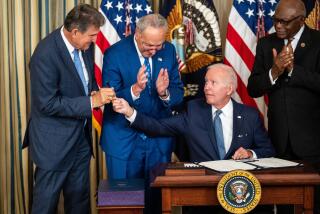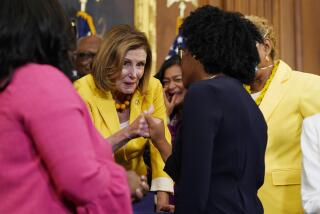Health Bill With Universal Coverage Backed by Panel : Legislation: Stark’s scaled-down benefits measure embraces Clinton’s major goal. Bitter debate shows more partisan fights lie ahead.
- Share via
WASHINGTON — President Clinton’s campaign to overhaul the nation’s health care system made its first tangible step forward in Congress Wednesday, when a House subcommittee narrowly approved a bill that embraces the President’s goal of assuring every American a broad package of medical benefits.
“We’ve given the American people reason to believe that Congress can and will act,” Ways and Means health subcommittee Chairman Pete Stark (D-Hayward) said after his panel had approved the legislation on a 6-5 vote, largely along party lines.
Passage came after more than two weeks of acrimonious debate, which provided a foretaste of the bitter partisan struggles to come.
“We may have lost this particular battle but I assure you we have not lost the war,” warned Rep. Bill Thomas of Bakersfield, the subcommittee’s ranking Republican.
Although the subcommittee measure would meet Clinton’s bottom-line demand for universal coverage, it would do it in ways that differ markedly from the plan that the Administration submitted to Congress last year.
Like Clinton’s proposal, the bill drafted by Stark would require every employer to contribute up to 80% of the costs of their workers’ health coverage.
However, the panel rejected the Clinton plan’s elaborate and untested bureaucratic structure under which most Americans would obtain their coverage through government-organized purchasing cooperatives.
Instead, the Stark plan contains an expanded Medicare program to cover people who are not insured through the workplace or private health plans.
Stark also sought to produce a less costly plan by scaling back the benefits that Clinton proposed. The basic package in the subcommittee bill includes higher deductibles and unlimited out-of-pocket costs. It does not include such costly benefits as long-term care.
Despite the changes, the White House counted the subcommittee vote as a victory. “The Administration commends the subcommittee members and Chairman Stark for their leadership,” spokeswoman Lorrie McHugh said. “Their diligent work has moved the process forward.”
Before the passage of the subcommittee bill, Republicans insisted that Clinton’s bill also be put to a vote, in a symbolic move aimed at embarrassing the White House. With Democrats voting “present,” it failed, 4 to 0.
There was no small irony in the fact that Stark was the driving force behind the Administration’s first health care victory in Congress.
Since the White House began its health effort more than a year ago, the Hayward Democrat has been one of its most persistent and vocal critics within the party.
Yet in the larger battle he proved a crucial ally. Stark shares the Administration’s basic aim of assuring coverage for everyone.
Now, the fight moves to the full committee, where the subcommittee legislation appears certain to undergo significant change--although probably not enough to win any GOP votes.
As the subcommittee completed its work, Ways and Means Chairman Dan Rostenkowski (D-Ill.) also served notice that he plans to ignore the tax provisions of the bill.
Those provisions proved the final hurdle for Stark as he sought to cobble together the six votes that he needed. He was forced to scuttle his proposed 0.8% payroll tax in favor of additional spending cuts and taxes that are not as broadly based.
One feature that remains in the subcommittee bill, however, is a $1.25-increase in the federal tax on each pack of cigarettes, 50 cents higher than Clinton had proposed.
Ultimately, only Rep. Michael A. Andrews (D-Tex.) defected from party ranks to oppose the measure.
While the subcommittee slogged toward final passage, the President and the First Lady pressed their campaign to drum up public support, courting doctors and nurses.
Referring to his proposal to create mandatory insurance-purchasing alliances, which many observers now consider dead, Clinton told 450 California Medical Assn. delegates meeting in Anaheim via satellite hookup: “I think it’ll all be debated in the Congress and I’m certainly flexible on it.”
More to Read
Get the L.A. Times Politics newsletter
Deeply reported insights into legislation, politics and policy from Sacramento, Washington and beyond. In your inbox twice per week.
You may occasionally receive promotional content from the Los Angeles Times.










